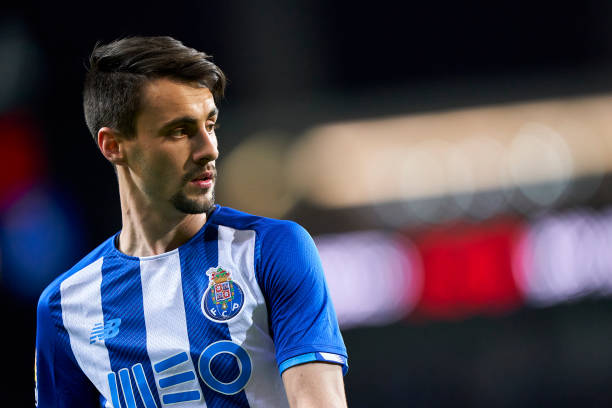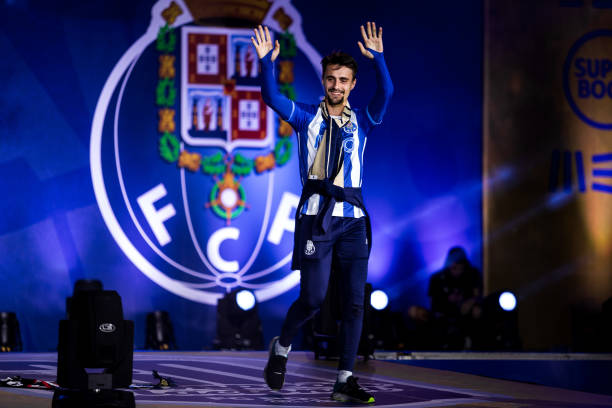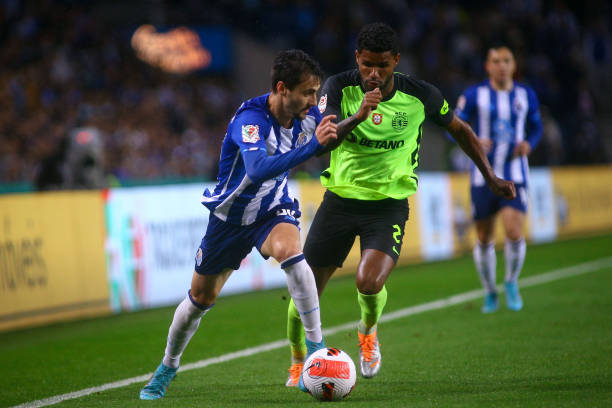 Making their first significant play in this summer’s transfer market, the Arsenal universe will be brimming with excitement at a rare Primeira Liga venture, as they secure the services of FC Porto’s Fábio Vieira for a reported £30-million fee, plus add-ons.
Making their first significant play in this summer’s transfer market, the Arsenal universe will be brimming with excitement at a rare Primeira Liga venture, as they secure the services of FC Porto’s Fábio Vieira for a reported £30-million fee, plus add-ons.
For fans of the Portuguese game, however, the move instils a great deal of déjà vu, depreciating and heightening the league in equal measure.
No less than a week ago, the media’s eye had Benfica’s Darwin Nuñez in focus ahead of a club-record move for Liverpool, joining the Uruguayan with former Porto poster-boy Luis Díaz.
Today, Fábio Vieira becomes the latest to enjoy the attention his talents deserve, but just how good can the Premier League-bound star be?
From a very young age, the young maestro never failed when it came to standing out, even in the thick of a star-studded UEFA Youth League final, won by Porto in 2019.
A first for the Dragons at youth level, Vieira spearheaded the Olival revolution, so often dwarfed by the array of talent coming out of Lisbon, more notably from rivals Sporting and Benfica.
All of a sudden, with a historic 3-1 against Chelsea complete with a Vieira opener, the Porto academy had begun garnering the respect much of their groundwork deserved, as a new generation filtered through.
Standing between the prospects and the illustrious Estádio do Dragão atmosphere was Sérgio Conceição, however, faced with the pressures that came with fighting for the title year after year.
Remaining true to his philosophy, Conceição’s attentions drifted towards more experienced and robust athletes, capable of playing with and handling the intensity conveyed from the dugout and out onto the pitch.
The trajectory from the youth set-up to the first-team, particularly for the frail figure of Vieira, appeared unattainable and began to cast doubts over the future of many of Porto’s talents.
Some still live with the sense of unfavourability to this very day, but Vieira is not one of them.
Breaking through with a debut against Marítimo in June 2020, with a first official goal in Porto colours not far behind, the wide playmaker has seen his involvement grow in the space of two years, holding no greater importance than he did at the tail end of last season.

As Porto said goodbye to Díaz, it was Vieira’s 11 goal contributions in his final 12 Primeira Liga games of the season that made up for the craft taken away by the Colombian en route to Liverpool.
Vieira claimed 14 league assists in total, backed up by six goals for himself that included strikes against Benfica and Sporting to cement his place as a Porto faithful darling.
By the end of it all, Sérgio Conceição too could pay no greater testament to the playmaker’s talents than picking poise over power, but the 22-year-old’s guile didn’t do the job alone.
Vieira grew into his role and encompassed the Porto ways, demonstrating he can be just as gritty as his fellow companions and contribute to the fight at hand.
Totally unfazed by the enormity of first-team football and the battleground the Dragons delve into, the young midfielder exudes maturity and the willingness to take advice on. The skill no doubt played a large role in his upcoming switch to Arsenal, but the mindset certainly coats what Vieira brings to the table nicely.
Questions will follow him into London, predominantly whether Arsenal needed him or not, but again, it’s his capability to do the talking with his mind and his feet that make him such a difficult player for the Gunners to pass on.
And so they didn’t. And there will be a clear vision in place for the hot prospect.
At the fruitful age of 22, Vieira joins like-minded young stars that are helping the current Arsenal boss, Mikel Arteta, rebuild the North Londoners in his own vision.
The much-loved Bukayo Saka and Gabriel Martinelli are just 20, Emile Smith-Rowe is a year older, meanwhile Martin Ødegaard has little more than a year on the inbound Portuguese man.
There’s a project there for Vieira, alongside players who also, like himself, are more than capable of excelling across multiple positions and roles.
 Just where the Santa Maria da Feira man lands and finds his feet will be an interesting one to track, particularly with the similarities shared with Ødegaard.
Just where the Santa Maria da Feira man lands and finds his feet will be an interesting one to track, particularly with the similarities shared with Ødegaard.
Both playmakers love to operate from the right, sitting in the half-space before drifting inwards. Naturally, this opens up the possibility for a clash, but there’s plenty of room to dream of an idyllic understanding too between the two footballing artists.
The plan at hand may even be to move Vieira away from the right side and have the Portuguese man line-up alongside his Norwegian counterpart, forming a creative pivot, not too dissimilar to the one formed at Arteta’s ex-club Manchester City with Bernardo Silva and Kevin De Bruyne.
That’s certainly the ceiling for Vieira - a sparkling creator who, as one of the brightest prospects coming out of Portuguese football, has drawn comparisons to his fellow compatriots Bernardo and Bruno Fernandes.
The stewardship of Arteta will be required to enable the player to make that transition and overcome an expected phase of adaptation, but the ingredients at hand indicate a match made in heaven between the current and former midfielder.
One-on-one handling of a player’s role has long been considered one of Arteta’s greatest strengths as a coach, stemming right through to his City days as a first-team coach, meanwhile Vieira arrives with the reputation of absorbing all the intricate details fed through by his manager Conceição, who’ll feel somewhat poorer in his absence.
International recognition shall come soon after, with Vieira well-positioned to rival the heavyweights in the Portugal national team at any moment. The Porto faithful, quite naturally, will be saddened by his exit. Their rivals, less so, but if there's one sentiment all corners of Portuguese football can share, it's the widespread expectation of a very prosperous future for the left-footed magician.
By Patrick Ribeiro

